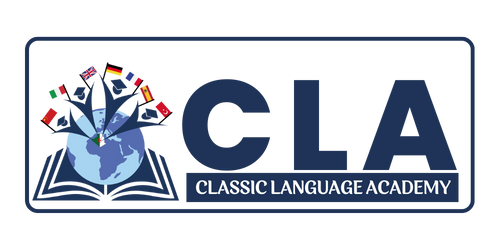In the current times, without any doubt, acquiring another language enhances one’s chances of experiencing travel, career growth and even personal development. Among such languages which can be considered useful on a global scale, German fits in perfectly. German is the language of over 100 million people across the globe and it is the widely spoken official language of Germany but also Austria, Switzerland, parts of Belgium and Luxembourg.
Therefore, in case you have ever considered taking up German, this is the best occasion for you to begin. With the help of the World Wide Web, you can comfortably learn how to speak German anywhere within this planet and also at your own speed. Nevertheless, considering the plethora of such resources available, the irony is that one can still get confused. No way! The present blog will offer you step by stage procedure of German language online e-learning in a fast and exciting manner.
Why Should One Learn German?

Before we dwell into the specifics, whereby we will study how German can be learnt over the internet, let us first consider the question as to why should one bother learning this language in the first place.
Business Reasons: This is the largest market in Europe and many world-famous organizations, including BMW, Siemens, Volkswagen, etc. Are based here. For somebody who works in engineering or technology or international business, for example, speaking German can be extremely beneficial.
Travel and Culture: History, art and culture are replete in Germany. There are many countries such as Germany, Austria and Switzerland that a visitor will be able to appreciate in all ways possible the German language. You will be able to read signs in the streets, talk to people in the cities and embrace more of the beautiful culture.
Academic Advantages: The first and foremost thing that comes to one’s mind is the quality of education prevailing in ‘Germany and this country offers its expertise in areas like science and technology and even philosophy. A number of German universities have German and English programs, but learning the language helps because it makes following lessons easier and speaking with the natives more possible.
Step 1. Establishing the Purpose of Learning German
What’s the point? What is it that motivates you to study a foreign language? Before you scour the internet for lessons to learn the language in question – in this case – German, it is important to take a step back and evaluate the purpose for learning German. The answer to this will influence the learning process. Just to add to these reasons, is it because of tourism, work related activities, or academic pursuits? Perhaps you are keen on German literary works or even wish to interact with German natives. Either way, in any undertaking, it is always good to have a clearly defined aim so as to avoid distractions and to remain driven all the time.
Short-Term Goals: within 2-3 months, learn basic phrases that will be useful in traveling.
Mid-Term Goals: within 6 months to 1 year, attain the level of speaking fluently.
Long-Term Goals: be able to read German novels or even conduct business in German language proficiently.
This is particularly true since setting achievable goals will help in maintaining active interest in the specific activities.
STEP 2: SELECTING THE APPROPRIATE ONLINE
When learning a new language through the internet, especially now that there are so many language learning programs available, it is very crucial to select appropriate programs that suit the learner’s style and objectives. Here is a brief description of some of the popular platforms:
Language Applications:
Duolingo: Best suited for first-time users. Duolingo will teach you the basic knowledge such as vocabulary and syntax through games. Lessons are short, thus suitable for practicing every day.
Babbel: This is a more controlled than Duolingo app, where you learn phrases appropriate for in-depth real-life situations and grammar in detail.
Memrise: Offers the possibility to master words and word combinations by using spaced learning techniques, and while new words are captured in the memory, older ones are filtered out so they remain in the active long-term memory.
Structured Online Programs:
Goethe Institute: Organizes extensive formal programs which take you from level zero to fluent. The certification offered by Goethe is also esteemed across the globe.
Website: Classic Language Academy website provide well planned courses in which instructors teach all the levels from novice to professional.
Video Channel:
Learn German with Anja: The channel focuses on language acquisition through fun and entertaining activities, such as engaging in games, singing, and performing drama, and offers wide coverage of the German lessons, for instance, lessons on basic structures and slang.
Easy German: This channel concentrates on natural speech with native German speakers, meaning it is perfect for listening practice.
In language exchange
HelloTalk and Tandem: These apps allow you to speak with a German native over a text, voice or video call. This is also effective in enabling oneself to engage into actual conversations where the language is brought into context thus the nuances of the language can be acquired in the process.
The essence of learning this language is in understanding that there are various means and approaches available, and each individual should select the one that works best for them.
Step 3 – Learn the Basics (A1-A2 Levels)
As a novice language learner, you must not only focus on building your communicative skills but also on laying down strong basic language skills as well. In this case, basic vocabulary learning, understanding the rules of German sentence construction, and development of correct speech accent will engage you in this stage.
Basic Vocabulary: See, what are the most necessary direct speech phrases in everyday communication, and enrich your vocabulary with the topics, prepared in advance:
- Greetings: Hallo (Hello), Guten Morgen (Good Morning)
- Numbers: eins (1), zwei (2), drei (3)
- Colors: blau (blue), rot (red), grün (green)
- Essential Verbs: sein (to be), haben (to have), gehen (to go)
Grammar: It is an established fact that the German grammatical structure is intricate. Do not however be daunted. Start by working with the following simple concepts:
- Sentence Sequence: German sentence structure is usually SVO. For example: Ich lerne Deutsch (I am learning German).
- Nouns’ Gender: There are three categories of gender in every noun when it comes to the German language: masculine, feminine, and neuter. Der (masculine) ( definite article ), die (feminine), das (neuter) are the definite articles learnt.
- Personal Verbs: German verbs follow the subject of the sentence in terms of the form. For example: Ich bin – I am, du bist – you are
Diction: The German language is mostly spoken as it is written utilizing the English phonetics, however, some exposure to a native speaker is crucial in order to understand the nuances. View video/ audio material that articulates the given content well. Doing this regularly will make you sound less like a foreigner.
Step 4: Incorporate language-learning applications into your daily routine

Language acquisition requires regular practice. Practice small amounts daily, for instance, 20 or 30 minutes should be observably sufficient. Following are some suggestions on how to improve your regular practice:
- Create A Schedule: Schedule lessons on language applications such as Duolingo and Babbel and ensure completion every day. Set aside time for vocabulary, grammar, and listening practice as well.
- Flashcards: You may also consider the help of apps such as Anki to help you make flashcards for those vocabularies that you find too hard to recall. Try to use spaced repetition techniques with these words.
- Short Talks: Now you can also start talking to people online using language exchange apps like HelloTalk. These can be very short and even the simplest of conversations will still help you.
Step 5: Train Your Ears and Mouth
After getting acquainted with basic words and phrases, the next step involves developing your listening and speaking skills. Many students dread this step the most but it is very necessary if you want to be fluent.
Podcasts and Videos:
Listening to Pimsleur’s beginner podcasts like Coffee Break German or Slow German is very helpful as these podcasts all teach at a designed slow rate of speech, making it easy for one to hear what the speaker is saying and hence to pick out the words.
Then move on to Easy German and watch the voiced-over videos where they go out on the streets and interview people, which can be helpful to understand their language use in naturalistic settings.
Speaking Skills:
Find a conversation partner on Tandem or Italki. Don’t feel intimidated. You will spend most of the time with educated native speakers and in a matter of time your language will be perfect, though it is not the case right now.
Make practice by recording your own voice and listening to it for a specific purpose that is checking the way you pronounce the words. This helps you to know what to work on.
Step 6: Move to Intermediate Level (B1-B2)
Now that you know the language’s basics, it is time to tackle the more advanced features of this language Even now, I would recommend thinking of ways how to enrich your vocabulary, of how to work on your grammar and how to carry out more difficult conversations.
Grammar Focus:
Learn how to make use of a subordinate user, modal verbs as well as the appropriate syntactic positioning of other words within a sentence that has more than 1 clause.
Contract noun adjective declensions that differ by gender case and number.
Reading Practice:
Try to find easy or short stories in German and read simple books. Graded readers, which are books specifically made for language learners, can prove to be extremely useful too.
Go to web pages such as Deutsche Welle and read news articles. Try to comprehend without translating every single word- rather, concentrate on the main idea of the article.
Writing Practice:
Include short compositions, one or more blog posts, and a diary entry (in German). Just do not jump in right away to the more advanced level of writing.
Join the platform and post in German for reviews, for instance, the German learning sub-Reddit on Reddit.
Step 7: Immersive Practices with Advanced Studies (C1-C2)
In the cause of reaching this level, immersion starts to carry more weight. You will want to polish your skills, and practice language as much as possible.
Media Immersion:
Watch German films, TV programs and series like Dark, Deutschland 83 or Tatort. This will not only enable you understand native speed speech, but it’s interesting too!
German radio stations or podcasts for proficient listeners. This aims at getting used to the speed and the varied tones of the speakers.
Focus on Speaking:
Make a point of always speaking to a native in a video call, or in real life, if possible, at least once every week. By this time, you should also cover such topics as current news, culture, or your thoughts.
Preparing for an Examination:
Here, we may flush out the last exhausted resources and consider taking classes or advanced language examination such as Goethe Zertifikat which covers B1-C2 levels. Preparing for these will enhance your reading, writing, listening and speaking aspect of the language.
Step 8: Stay Inspired and Take Pleasure in it
New languages take time to learn more so there is bound to be frustration or periods of stagnation throughout the learning process. Here’s how to keep your spirits high:
Set Goals: Rejoice in minor achievements such as speaking your first sentence or finishing your first German newspaper.
Help Other Learners: Learn together with other students in language classes or on the internet. This enables you to bond with other persons going through the same thing which makes it easier for you to pass on the motivation as well.
Give Yourself a Break: Allow yourself to put the things you enjoy the most while studying the language be it playing German video games, reading German books, or doing other German-related activities.
Conclusion
It is optimal and possible to learn German online, but it takes time, a lot of learning, and the use of proper strategies. After reading this guide, you can be sure to lay a strong ground, advance comfortably with further training and later orima fluency.
The most important thing is to keep doing it, practice every day and enjoy it. As there are many free websites that teach German as a second language, one can easily tailor make how they want to study. Well, then why don’t you start something new? Go ahead, and before long, you will be speaking in German confidently.






